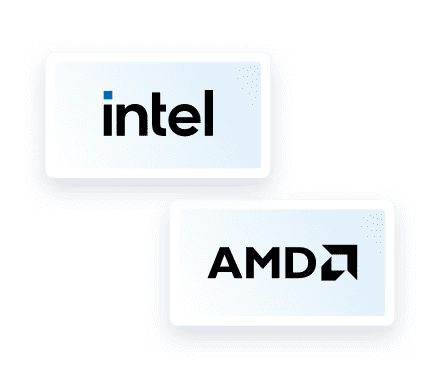Dedicated Servers
Performance through innovation
- Dedicated enterprise hardware
- Configurable hardware equipment
- ISO-certified data centers


Your server options
Discover our new line of AMD servers featuring the latest Ryzen Pro and Epyc processors — ideal for applications that require multiple cores.
NEW EPYC 4005™
Save
Save
GPU servers
Uncompromising data security
All of our servers come with RAID technology so that your business-critical data is safe and accessible when needed.
Latest storage and processor technology
Advanced data center-grade storage technology and the latest generation of processors ensure enhanced server performance, scalability and blazing-fast data access times. Choose from high-capacity HDD storage, reliable SSD or high-speed NVMe options.
A range of reliable Intel® processors from the Xeon® E up to high-end scalable Xeon® Gold CPUs provide the ideal platform for any workload.
AMD fan? Configure your server with a range of AMD Ryzen Pro and Epyc processors that supply peak performance, no matter the use case.
Reliable and secure network
Advanced firewall
Extended security
US data centers
Ideal uses for your dedicated server


Only at IONOS
Your personal consultant
After you order, your personal consultant will guide and support you every step of the way.
24/7 expert support
Technical questions? Our award-winning experts are always available to help by phone, chat or email.
Dedicated servers – FAQs
Once your server is up and running, you can jump into your Cloud Panel and take charge:https://login.ionos.ca/.
Essential Resources For a Seamless Start: Discover easy-to-follow guides and practicaltips to streamline your setup and maximize your server’s potential:https://www.ionos.ca/help/server-cloud-infrastructure/.
Comprehensive Support Every Step of the Way: Your server’s performance and yourpeace of mind are our top priorities. From hardware reliability to software essentials, we’rehere for you. Explore our Scope of Support for detailed information and assistanceoptions, including:
Self-Service: Manage access, configure firewalls, and follow best practices for effectivebackups.
Expert Premium Assistance: For advanced needs like custom setups or complexconfigurations, our experts are here to help. You can find our contact details here.
Stay Ahead with Proactive Data Protection:
Backups: Ensure complete data security with our Cloud Backup solutions. Find step-by-stepsetup instructions in our Help Center.
Health Monitoring: Regular HDD/SSD health checks are essential especially for dedicatedservers. Early detection helps prevent downtime and data loss.
Need assistance? Our team is ready to help: Find our contact details here.
A dedicated server is one that the user has exclusive access to. In other words, the installed resources and components (CPU, RAM, storage, network access, etc.) are exclusively available to a single dedicated server user.
The advantages of this are:
- There are no other users depending on your hardware
- The price/performance ratio of dedicated servers is better than that of virtualized servers
- A high level of computing power is available.
The special features of IONOS dedicated hosting are:
- Flexibility – With IONOS, users can rent dedicated servers on demand. There is no minimum contract term and our services are available within minutes of purchasing.
- Functionality – With our Cloud Panel, you can add numerous cloud features, such as shared storage or a load balancer, to your environment at any time.
- Support – Users can benefit from our exceptional service and receive a personal contact who will provide advice and assistance with any technical challenges or configuration questions you might have. Please feel free to email or call us at any time.
- … cPanel?
Not yet, but we're working on it! Soon you'll be able to enjoy the advantages of cPanel when using our products.
- … WHM?
No, not currently.
- … static IP addresses?
Yes, your server has a static IPv4 address.
- … multiple IP addresses?
Yes, our users can either use additional IPv4 addresses for a fee or set up a free IPv6 subnet to their server product.
- … SSD?
Yes, our dedicated hosting server offers the following media storage options:
HDD
(SATA) SSD
NVMe SSDSSD is an electronic storage media without any moving parts. Data is read and written much faster than with conventional HDD hard disks.
… Plesk?
Yes, your server administration can be done with Plesk Obsidian on request. You can also order an unlimited number of domains for your server.
The access to your system and your information takes place…
- with Linux servers via an encrypted connection with SSH
- with Windows servers via RDP.
Should a problem occur with the network or the firewall, a KVM VNC console is also available to ensure access.
Since this is a product with root access, you are free to install applications of your choice (within the scope of the general terms and conditions). Dedicated server use cases include:
- web servers
- email marketing platforms
- game servers
- video streaming platforms
- building a forum or a community
- as development environments for online stores with:
WordPress with WooCommerce
- Magento
- PrestaShop
- Shopify
- And more
Yes, virtualization using a hypervisor or virtual machine monitor (VMM) is possible with all IONOS dedicated server plans that include Intel Scalable processors and AMD Epyc processors. The corresponding packages come with the technical foundation required to create virtual machines on your dedicated server using a hypervisor and to manage their resources. In addition, you can use almost any hypervisor except for Hyper-V. Due to Microsoft’s license terms, you cannot currently use Hyper-V as a hypervisor in combination with IONOS dedicated server plans.
Thanks to the hypervisor or virtual machine monitor (VMM), you can set up several different, completely isolated virtual machines with various operating systems. You can operate them in parallel on a single host system (in this case, it would be on your dedicated server). The virtual servers share their powerful hardware resources (processing power, RAM, disk space, network components), but cannot access files from another virtual machine that is running in parallel. This ensures that only individual virtual machines are affected if there is a program error or contamination during software testing, for example. The other virtual machines or test environments being managed on your dedicated server using a hypervisor remain protected and continue to work uninterrupted.
General information on hypervisors is also available in the Help Center.
Extensive information on the topic of virtualization can also be found in our Digital Guide.
The following options contribute to the effective data protection of your business-critical services:
- Your data traffic with the server is encrypted as long as you establish a domain secured with the included SSL Wildcard Certificate.
- In the Cloud Panel, you define the rules for your firewall yourself.
- Our network is equipped with extensive intrusion detection and intrusion prevention systems.
- Our SIEM software constantly monitors and analyzes security alerts, guaranteeing users high availability and secure products.
- Our data centers are ISO certified according to strict standards.
- 100 % protection against DDOS attacks is currently not possible.
Unlike a dedicated server, a private cloud is a virtualized environment.
The latter is suitable if you operate multiple logically separate, individual software applications on their own hardware that do not require many resources.
If you run a larger or performance-intensive application on your hardware, a dedicated server is recommended.
Details of the scope of support can be found in the following Help Center article.
